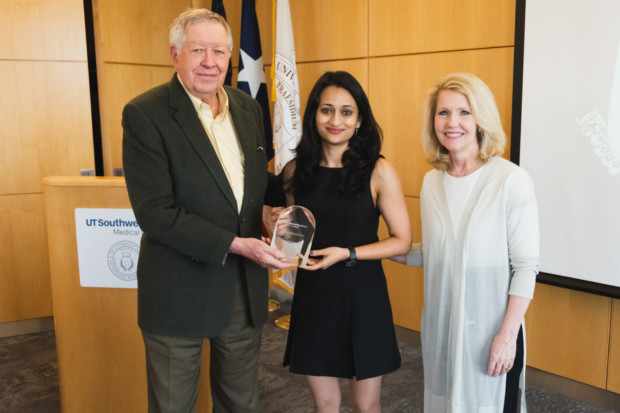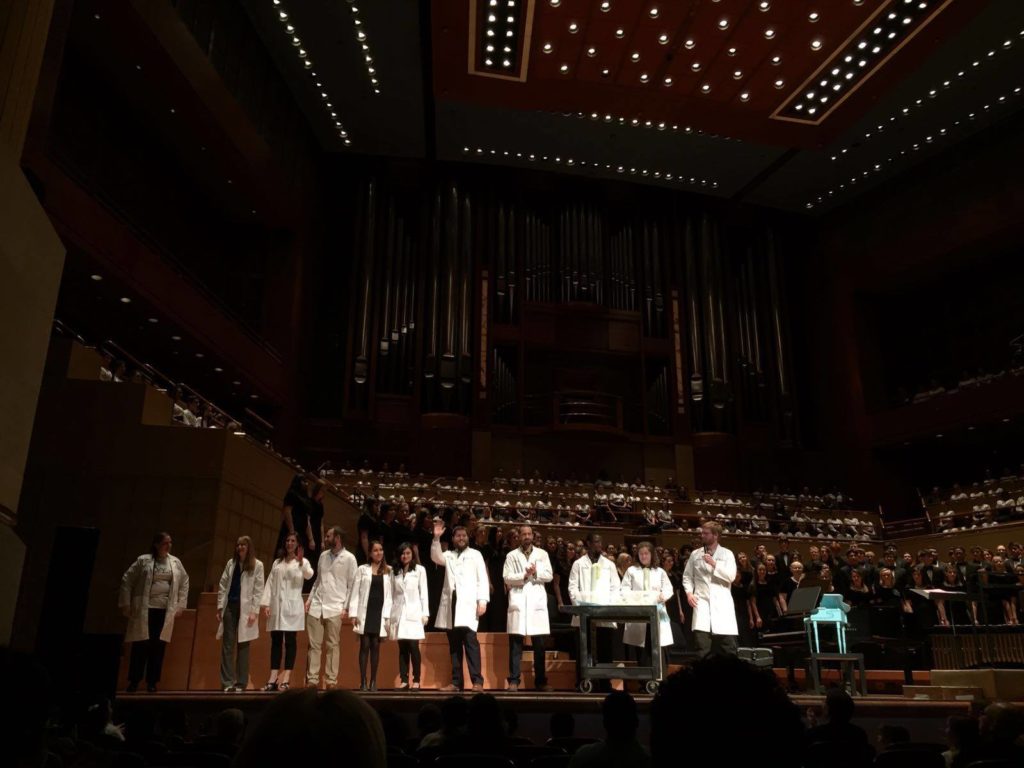
By Bishakha Mona, Ph.D.
Ida Green was a visionary involved in numerous civic affairs, including her support for women’s rights. It is a great honor to be the recipient of the Ida M. Green Award, presented by Southwestern Medical Foundation to a female graduate student. It is my honor to be part of an organization that encourages and recognizes the efforts of women in science and community service.
I was born and brought up in a family with doctors which made medical conditions, diseases, and their treatments major topics of dining table discussions. At an early age, I witnessed how ruthless some diseases can be and how helpless doctors are at the hands of knowledge, or lack thereof, we have regarding those human conditions.
The fact that we still don’t understand a significant amount about our body, its functioning, and why our susceptibility to various pathological conditions varies greatly, led me to a career in scientific research.
Bishakha Mona, Ph.D., 2019 Ida M. Green Award Recipient

Growing up in rural India, another aspect of society that I witnessed was the parallel between level of education and quality of life. It’s been rightly said – knowledge is power. Education can provide the right tools to learn and make better informed life decisions. One incident comes to mind when I think about the need for better education.
During a summer internship at World Health Organization’s Pulse Polio initiative program in Bihar, I was working with a group of doctors as a part of door-to-door surveillance to track any children with polio-like symptoms. In that region, very few homes have toilets and unsanitary disposal leads to the spread of various diseases. On one rainy evening, we met a single mother of four kids who refused to vaccinate. On further probing, we realized that she didn’t understand how vaccines work and didn’t think they would prevent the disease. Sewage water mixed with rain running beside her house was the proof that she had a point, just asking people to vaccinate is not going to eradicate polio in that or any neighborhood. I realized the need for educating people about the power of vaccination as well as general spread of diseases and how to prevent them. After multiple visits to the village, it was a proud moment for me when she decided to vaccinate her kids and be a leader in educating her neighbors about the importance of vaccines and proper sanitation.
This is a success story of intervention and education that in time could lead to informed decision not only for an individual but for the entire community. It was clear to me that I wanted to be a part of more stories like this and make a difference in people’s lives for the better.
I decided to come to UT Southwestern Medical Center because of its rich history of scientific breakthroughs and ongoing pioneering efforts to transition basic science research to clinics. Here, I have had the opportunity to work with and learn from some extraordinary mentors. One of the tidbits of wisdom that all new graduate students are told is to focus on choosing a supervisor that fits best with you. Looking back, I greatly appreciate the importance of that advice, and can truly say that joining Dr. Jane Johnson’s lab was the best decision I could have made. Under Jane’s leadership, I have learned the value of integrity and scientific rigor and feel prepared to face any challenges that I will come across as I continue forward in my scientific journey.
My journey at UT Southwestern would have been very different if I had not met Dr. Natalie Lundsteen. I approached her to learn about career development opportunities and she encouraged me to participate and later lead the Science Policy, Education and Communication club. Organizing the club activities, especially the science outreach events, helped me identify my passion for science communication. Being a shy, introverted person, it was always a challenge for me to participate in let alone lead such group activities. Natalie was crucial in helping me push my boundaries and get out of my comfort zone. She has been my champion since day one, guiding me towards realizing my career path involving encouragement and education of people about the importance of scientific research.
The Ida M. Green Award aims to acknowledge the contribution of women to science and society. It is a representation of UT Southwestern’s support in nurturing more women in science.
The Women in Science and Medicine Advisory Committee at UT Southwestern does a great job of promoting women role models. They foster an environment of growth and inclusivity, providing inspiration to the next generation of women in science. I feel grateful to have found amazing female mentors at UT Southwestern who have inculcated my love for knowledge and the wisdom to utilize it to help people around me.
I would like to dedicate this award to every woman who has inspired me and made me aspire to be a similar role model for the next generation of scientists.

I believe that it is our responsibility as scientists to not only acquire knowledge, but also to communicate it to the public.
This award is an acknowledgement of those efforts and I hope it inspires more women to identify their own potential and participate in empowering others. Personally, it has motivated me to keep seeking opportunities where I can add value, be it research, teaching, or helping others realize their dreams. Success for me would be if I can keep learning something new every day and utilizing my knowledge to give back to the community in a meaningful way.